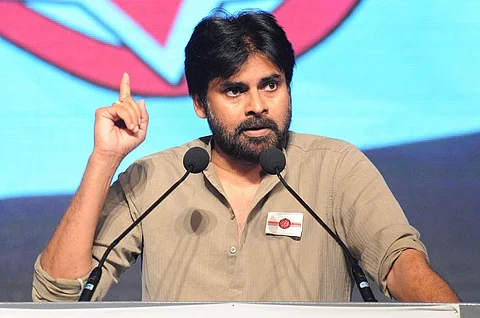

Pawan Kalyan has made two major announcements in the last few days that could have wide-ranging impact on the caste politics of Andhra Pradesh, especially its feudal Rayalseema region.
First, Pawan Kalyan said he would base his Jana Sena party in Anantapur and most likely, contest from there. Second, his party would conduct something called ‘praja darbars’ across the state of Andhra Pradesh to initiate discussion re-looking the reservation policy, not just in the state but in the entire country. In other words, poor forward-caste students who do not have the benefit of ‘quota’ should be given financial help.
He might have started well with this strategy, but it is important to understand the context behind this to further make sense of his future moves.
Regarding the first announcement, many news channels have already mentioned that several other senior political leaders in the state too have contested from Rayalaseema: The notorious election of PV Narasimha Rao, the first PM from south India, with a record margin of half a million votes from Nandyal; Kotla Vijaya Bhaskar Reddy the former CM from Kurnool; and the more recent CMs YS Rajasekhara Reddy from Pulivendula and N Chandrababu Naidu, the current CM from Kuppam are some examples.
But this does not explain the full story.
Rayalaseema has peculiar history, a rather unfortunate one at that. In fact, some of the first images that come to mind about anyone from Andhra Pradesh, are of village factions fighting each other — sometimes with stones, sometimes with sticks and machetes, most of the time with crude bombs and now more recently with guns — in a barren semi-arid terrain which is notorious for droughts and farmer suicides.
This violent culture, which is a remnant of the village chieftains from the post-Vijayanagara empire period is a feudal-sanguine-patriarchy where every village has a chieftain (usually called a Reddi irrespective of his caste) who rule the village with an iron fist. This has been gloried and romanticised to great extent in Telugu films since the early 2000s.
After independence, as we adopted parliamentary democracy, politicians started using these social relations to win elections. And anybody who is slightly familiar with the politics of AP would know that nobody epitomised this better than YS Rajashekara Reddy. If the candidates have the support of the chieftains, they can rest assured that the chieftains will ensure, by whatever ‘democratic’ means, that the majority of the village votes for them.
Earlier the INC and TDP fought with each other to win over these chieftains. Now the INC is at its weakest in AP, thanks to its bifurcation baggage, and also at the centre, thanks to the corruption charges.
So, the interesting thing to watch out for, would be to see whether Pawan Kalyan can tap into these social resources that the defeated INC leaders still continue to command. Since the younger generation of these leaders are now taking over their fathers’ legacies, there are good chances that they might join hands with Pawan Kalyan. Anyway, switching party loyalties has never been a taboo in AP politics — where money rules and not ideology and principles — starting from Chandrababu Naidu to more recent stream of defections.
Coming to the second announcement, Rayalaseema has a substantial kapu population. Kapu, similar to Jat, is a term used to denote cultivation rather than a caste name. They are the poorer cousins of the Reddys and Kammas (explained here). Kapus will be severely affected with drought being announced in 268 mandals in the state – Anantapur having 63 drought-hit mandals followed by Chittoor (53), Kurnool (36), and Kadapa (32). All four district are in the Rayalaseema region.
Moreover, the ambitious ‘jalayagnam’ started by YSR to provide water to these lands by diverting 180 TMC of water from Godavari to the Krishna is yet to be completed. Incomplete projects include the Pothireddypadu reservoir, Handri-Neeva Sujala Sravanthi, and Galeru-Nagari Sujala Sravanthi lift irrigation projects. Their situation will continue to be worse than precarious. Canals have been dug so that the contractor sand sub-contractors can make money; who cares about whether water flows in them or not? It is the children of these cultivators who are also part of the kapu agitation demanding reservation, whom Pawan Kalyan – himself is a kapu – is courting. He might couch this in universal terms of merit but his intention seems to be very clear.
Finally, with leaders from Rayalaseema crying foul that they would be left in the shadow — just like their region itself which falls in the rain shadow region of the Western Ghats — of the kind of ‘development’ trajectory Naidu is following, Pawan Kalyan, has begun to cultivate them. With his personal romanticisation of an idyllic farmer’s life, he has begun well to consolidate this disaffected lot — similar to what YSR did in 2004, and convert them into winning votes for the next assembly election in 2019. Whether he does this successfully or not is to be seen in the future but for now it is imperative to watch this space closely.